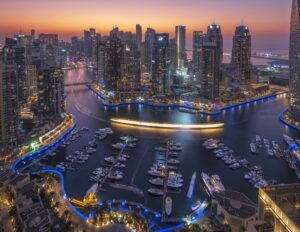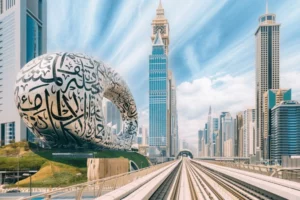Understanding Off-Plan and Secondary Market
Definition of Off-Plan Properties
Off-plan properties refer to properties yet to be constructed based on architectural plans. In Dubai, off-plan properties are sold at lower prices than secondary market properties. This is because buyers still need to invest in a property. Therefore, off-plan properties are ideal for buyers looking for affordable options.
Off-plan properties typically take between one to three years to complete. During this period, buyers are required to make payments in installments. Developers often offer payment plans that allow buyers to spread the cost of the property over a set period.
Definition of Secondary Market Properties
Secondary market properties are those that have already been built, are available for immediate move-in, or are already occupied. These properties are sold at market value, meaning the price is set according to the market conditions.
In Dubai, secondary market properties are ideal for buyers who need a property immediately. These properties are also suitable for buyers who want to avoid the risks of off-plan properties. Buyers must scrutinize property titles and address potential legal encumbrances when buying a secondary market property.
Overall, off-plan and secondary market properties have their advantages and disadvantages. Buyers need to weigh each option’s pros and cons before deciding.

Advantages of Off-Plan Investments
Off-plan investments can be lucrative for those looking to invest in Dubai’s real estate market. Here are some advantages of investing in off-plan properties:
Flexible Payment Plans
One of the most significant advantages of investing in off-plan properties is developers’ flexible payment plans. Buyers can pay in installments, spread out over a more extended period. This allows investors to manage their finances and plan their payments accordingly, making it easier to invest in multiple properties simultaneously.
Potential for Capital Appreciation
Investing in off-plan properties also offers the benefit of future financial appreciation. Because the property hasn’t been built yet, investors may buy it for less than its market worth. The value of the property may rise while it is constructed, enabling investors to sell it for more money and earn a profit.
Developer Incentives
Developers may offer incentives to buyers who invest in off-plan properties. These incentives may include discounts, waived fees, or other benefits. These incentives can offset the property’s cost, making it a more attractive investment option.
Purchasing off-plan real estate may be a smart choice for anybody wishing to participate in the Dubai real estate market. Off-plan investments have the potential to yield substantial returns for investors because to their flexible payment plans, capital appreciation potential, and developer incentives.
Advantages of Secondary Market Investments
Investing in secondary properties in Dubai offers several advantages for buyers. These include:
Immediate Ownership
One of the main advantages of buying a secondary property is that the buyer can take immediate ownership of the property. This is because the property is already built and ready for occupancy. In contrast, off-plan properties require a waiting period before the property is completed and ready for occupancy. Depending on the development, this waiting period can range from several months to a few years.
Established Communities
These communities are often well-developed and offer a range of amenities, including schools, parks, and shopping centers. In contrast, off-plan properties are usually located in new or developing areas, which may offer amenities different from those found in established communities.
Known Market Price
Secondary properties have a known market price based on the current market conditions. This makes it easier for buyers to assess the property’s value and negotiate a good price. In contrast, off-plan properties are often sold at a discount, making it difficult to determine the property’s actual market value.
Overall, investing in secondary properties in Dubai offers several advantages for buyers. These include immediate ownership, established communities, and a known market price.

Risks and Considerations
Several risks and considerations should be considered When investing in real estate in Dubai. These risks and considerations are significant when deciding between off-plan and secondary market properties.
Project Abandonment and Delivery Risks
A significant ris associated with off-plan properties is the risk of project abandonment. This occurs when a developer cannot complete a project due to financial difficulties or other reasons. Such a situation can devastate investors who have already paid the property substantially. In contrast, secondary market properties are already built and are available for immediate occupancy, reducing the risk of project abandonment.
Market Fluctuations and Trends
Another important consideration when investing in real estate is market fluctuations and trends. The real estate market in Dubai is very dynamic, and property prices can fluctuate rapidly. Investors should carefully evaluate market trends and fluctuations before investing in off-plan or secondary market properties. Off-plan properties generally offer the potential for higher ROI, but they also come with higher risks. Secondary market properties, on the other hand, offer more excellent stability but may provide a different level of returns than off-plan properties.
Investment Goals and Risk Tolerance
Selecting between off-plan and secondary market homes requires thorough evaluation of your investment objectives and risk tolerance. Those who have a lengthy investment horizon and a high risk tolerance may find it easier to invest in off-plan buildings. On the other hand, investors who have a shorter investment horizon and a lower risk tolerance could choose the stability that secondary market assets provide.
Buying Process and Payment Structures
When purchasing a property in Dubai, the buying process and payment structures can vary depending on whether it is an off-plan or secondary market property. Here are some key differences to keep in mind.
Off-Plan Payment Plans
Off-plan properties in Dubai typically require a payment plan structured in stages. Buyers generally need to make an initial deposit of 10-20% of the total property value, followed by further payments at specific stages of the construction process. The final payment is usually due upon completion of the property.
One advantage of off-plan payment plans is that they can be more flexible than those offered for secondary market properties. Developers may offer extended payment plans, allowing buyers to pay in installments over a more extended period.
It is important to note that when purchasing an off-plan property, the developer must open an escrow account to hold the buyer’s payments until the property is completed. This provides a layer of security for buyers, ensuring their payments are protected until the property is delivered.
Secondary Market Mortgages and Down Payments
In contrast to off-plan properties, secondary market properties in Dubai are typically purchased using a mortgage. This means buyers must make a down payment, usually around 25% of the property value.
One advantage of purchasing a secondary market property is that buyers can often negotiate the terms of their mortgage with their lender. This can include the interest rate, repayment period, and other key terms.
A sales and purchase agreement outlining the conditions of the sale must be signed by buyers of secondary market real estate. It is essential that you thoroughly read this agreement before signing it, since it is legally enforceable.
Before making a decision, it is crucial to thoroughly analyze the payment structure and purchase procedure, whether you are buying an off-plan or secondary market property in Dubai. Buyers may make choices that suit their requirements and tastes by being aware of the key distinctions between the two.

Legal and Regulatory Aspects
Legal and regulatory compliance is paramount when buying a property in Dubai. The following subsections provide an overview of the legal and regulatory aspects buyers must consider before investing in off-plan or secondary market properties.
Developer Track Record and Escrow Accounts
The developer’s track record is one of the most important factors when investing in off-plan properties. Buyers should research the developer’s reputation and track record in the market before purchasing. Dubai developers must register with the Dubai Land Department (DLD) and open an escrow account for each project. An escrow account is a different bank account that holds the buyer’s funds until the property is completed. This ensures the developer uses the funds for the intended purpose and protects the buyer’s interests.
Sales and Purchase Agreements
Sales and Purchase Agreements (SPAs) are legal contracts that outline the terms and conditions of the property purchase. Buyers should carefully review the SPA before signing to ensure that all terms and conditions are fair and reasonable. The SPA should include details such as the payment schedule, completion date, and any penalties for late payment or breach of contract.
No Objection Certificates (NOC)
No Objection Certificates (NOCs) are issued by the developer and are required for the transfer of ownership of the property. Buyers should ensure that the developer has obtained all necessary NOCs before purchasing. NOCs are required from various government departments, such as the Dubai Electricity and Water Authority and the Dubai Municipality.
In summary, buyers should understand the legal and regulatory aspects of buying a property in Dubai before investing in off-plan or secondary market properties. By considering factors such as the developer’s track record, SPAs, and NOCs, buyers can protect their investment and ensure a smooth transaction.
Customization and Property Features
Regarding customization options, off-plan properties in Dubai offer a wide range of possibilities. Buyers can influence their property’s design, layout, and finishes, creating a personalized living space that suits their needs and preferences. This level of customization is not available in secondary market properties, which are already built and may have limited options for modifications.
Customization Options in Off-Plan Properties
Off-plan properties in Dubai allow buyers to customize their living space to a great extent. Buyers can choose from various finishes, including flooring, wall paint, and kitchen countertops. In addition, buyers can choose from various design options, including modern, contemporary, or traditional styles.
Cutting-Edge Designs and Amenities
Off-plan properties in Dubai are known for their cutting-edge designs and amenities. Developers constantly reach new heights of design and innovation, offering buyers the latest technology and luxury. Many off-plan properties provide state-of-the-art facilities, such as swimming pools, gyms, and spas, and high-end finishes, such as marble flooring, designer kitchens, and smart home automation systems.
In contrast, secondary market properties may offer a different level of luxury and innovation. While some secondary market properties may have been recently renovated, they may have a different level of technology and design features than off-plan properties. Buyers looking for the latest luxury and innovation may prefer investing in an off-plan property.
Overall, off-plan properties in Dubai offer a range of customization options and cutting-edge designs and amenities that may not be available in secondary market properties. Buyers looking for a personalized living space that reflects their needs and preferences may prefer to invest in an off-plan property.

Market Dynamics and Investment Strategies
Real estate investing is a long-term plan that necessitates thoughtful analysis of investment methods and market conditions. The real estate field in Dubai is renowned for offering excellent rental income opportunities and significant returns on investment. When purchasing real estate in Dubai, buyers have two options: secondary market or off-plan. Every choice has benefits and drawbacks, so choosing well requires knowledge of investing methods and market dynamics.
Comparing Returns on Investment
One of the critical factors to think of when investing in properties is the return on investment. ROI is the percentage of profit that an investor makes from their investment. In Dubai, off-plan properties typically offer higher ROI than secondary market properties. This is because off-plan properties are often sold at a lower price during the pre-handover stage and then increase in value once handed over. Secondary market properties, on the other hand, are already built and have a higher price tag, which means the ROI is likely to be lower.
Rental Income Prospects
A different factor to consider when investing in real estate is rental income prospects. In Dubai, rental income is a massive source of income for many property investors. Regarding rental income, secondary market properties have an advantage over off-plan properties. This is because secondary market properties are already built and ready to be rented out. In contrast, off-plan properties can take several years before they are handed over and ready for occupancy.
Long-Term vs. Short-Term Investment
Regarding investment strategies, buyers must decide whether to make a long-term or short-term investment. Off-plan properties are generally better for long-term investments, offering higher ROI. Secondary market properties, on the other hand, are a better choice for short-term investments, as they are ready to be rented out immediately.
In conclusion, understanding the market dynamics and investment strategies is crucial when investing in real estate in Dubai. Buyers must carefully weigh the advantages and disadvantages of off-plan and secondary market properties and decide which option best suits their investment goals.
Dubai MLS
Dubai MLS, founded by the bright mind of Ahmed Elbatrawy, is a groundbreaking platform set to revolutionize the real estate industry by providing a comprehensive Multiple Listing Service explicitly tailored for Dubai. With its innovative approach, Dubai MLS promises to streamline property transactions and unlock unprecedented opportunities in the dynamic Dubai market.

Frequently Asked Questions
What are the key distinctions between off-plan and ready properties in Dubai?
Off-plan properties have yet to be constructed, while ready properties are already built and available for immediate move-in or are already occupied. The critical distinction between the two is the timeline for ownership and occupancy. With off-plan properties, buyers purchase based on architectural plans and must wait for construction to be completed before taking ownership. With ready properties, buyers can take ownership immediately.
What are the advantages and risks of buying off-plan property in Dubai?
The opportunity to save money during the early stages of development is one of the key benefits of purchasing off-plan real estate in Dubai. During the pre-construction stage, developers frequently provide incentives to customers, such flexible payment arrangements, which can result in substantial savings. Purchasing real estate off-plan, however, has certain dangers as well, such the potential for delays or modifications to the initial designs.
How does the secondary market for real estate operate in Dubai?
The secondary market for real estate in Dubai refers to the buying and selling properties that have already been built and are no longer in the pre-construction phase. In the secondary market, properties are typically sold by their current owners rather than developers.
What should investors know about the primary vs secondary real estate markets in Dubai?
Investors should know the critical differences between Dubai’s primary and secondary real estate markets. In the primary market, buyers purchase directly from developers during pre-construction. In the secondary market, properties are sold by their current owners. Prices in the primary market are often lower, but more risk is involved as buyers purchase based on architectural plans. In the secondary market, buyers can see the property before buying, but prices may be higher.
Can you explain the concept of on-plan property as opposed to off-plan?
On-plan property is not commonly used in the real estate industry. It may be used interchangeably with off-plan property, but it is not a widely recognized term.
Why might one invest in the secondary market instead of off-plan developments in Dubai?
Investing in the secondary market can offer several advantages over off-plan developments. Buyers can see the property before purchasing, which can provide more certainty about the condition and quality of the property. Additionally, prices in the secondary market may be more stable and less subject to fluctuations than prices in the off-plan market. Finally, there is less risk involved in buying a property that has already been built and is occupied, as opposed to buying based on architectural plans.












